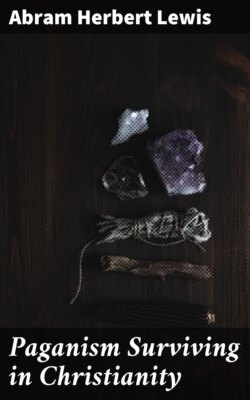Читать книгу Paganism Surviving in Christianity - Abram Herbert Lewis - Страница 7
На сайте Литреса книга снята с продажи.
Gnosticism.
ОглавлениеTable of Contents
Long before the time of Christ the Oriental religions had developed a system of philosophy in which were the seeds of that which in later times was known as gnosticism. This claimed to hold within itself “the knowledge of God and of man, of the being and the providence of the former, and of the creation and destiny of the latter.”[26] In its journey westward this system had mingled with Jewish thought and given rise to the Kabbalists or Jewish Gnostics. In the Oriental religions all external phenomena expressed a hidden meaning. Applying this doctrine to the Scriptures, the Jewish Gnostics taught that a hidden meaning was to be found in all laws, ceremonies, and rituals. They invented the theory that a secret tradition had been handed down from the time of Moses; the interpretation of the Jewish Scriptures had been greatly perverted in this way. Gnosticism said: “Nothing is what it seems to be; everything tangible is the symbol of something invisible. By this means the history of the Old Testament was sublimated into a history of the emancipation of reason from sense.”[27] This application of the allegorical method of interpretation to the Old Testament enabled pagan philosophers to draw from it whatever fancies they chose. This method also favored a tendency among the early Christians to interpret the Old Testament so as to find upon every leaf of the book some reference to Christ and the Christian religion. Thus gnosticism had prepared the way for the obliteration of the concrete positiveness of the Old Testament, and destroyed its authority in a great degree.
The entire Grecian world was thoroughly permeated as to its literature and philosophy with the spirit and practice of gnosticism. It formed the bridge between Judaism on its intellectual side, and the Oriental, Grecian, and Egyptian cults. When the infant Christianity came in contact with Greek thought, gnostic influences and tendencies assailed it on every hand. Thus, through a gnostic element already within the Jewish Church, and the cultured, powerful gnostic influences in the pagan world, nascent Christianity was like the traveller from Jerusalem to Jericho who fell among thieves. The intellectual unrest of the age favored the process of corruption which went rapidly forward.
